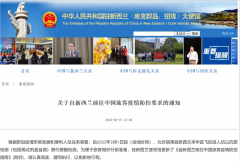加拿大华人论坛 加拿大百科China's environmental woes 北京污染日益严重
在加拿大
China's environmental woesNovember 10, 2006Sometime in the next week, I'll buy an air purifier. It's usually at the top of the shopping list for newly arrived expats in China. I don't want to put this off because the air pollution in the city seems worse in the past two years. White smog almost touched down in Beijing one summer afternoon. The smog was so thick, I could see only the faint outlines of tall, distant buildings. It felt unhealthy to breathe, and I had to cover my nose and mouth with a jacket. Indeed, Beijing is the world's worst city for air pollution. Sixteen of the world's 20 most-polluted cities are in China, according to the World Bank. Satellite data from the European Space Agency reveals that Beijing and nearby northeastern provinces have the highest levels of nitrogen dioxide, causing respiratory problems and about 400,000 premature deaths per year. Pollutants in China's sky have increased by 50 per cent in the past decade. Heavy industry, power plants and escalating numbers of car owners are to blame. China also burns more coal than any country in the world and is one of the biggest carbon emitters. In the next decade, if the government does not drastically curb these levels, China will more than double its carbon emissions by 2015 to 1.8 billion tons, surpassing the United States as the leading carbon emitter in the world (and as the leading contributor to climate change). There's another reason to be worried. Researchers in North America are very concerned about toxic pollution-particles drifting from China across the Pacific, and the fact that it will likely increase dramatically in the years to come. China plans to spend 1 trillion yuan ($140 billion CDN) to improve water treatment and recycling by 2010. Yet a water crisis of epic proportions looms on the horizon. It's hard to fathom that 300 million people in China don't have access to clean water. And it's because more than 70 per cent of China's rivers and lakes are polluted, according to state media reports, including the Yangtze and Yellow rivers. Health problems and social instability are but a few of the byproducts of the pollution problem. Officials have said recently that acid rain, caused by sulphur dioxide, poses threats to food safety in a third of China's farmland. Last year, at least 50,000 disputes and protests related to environmental pollution took place in China, an increase of about 30 per cent, according to the China Daily. In several instances, villagers banded together against a plant or factory that was spewing pollution and seriously affecting their quality of life. Many of these riots turned violent. Chinese government officials have promised to partner with the State Environment Protection Administration (SEPA) to crack down on corrupt officials who have allowed companies to discharge heavy pollutants. The government also has promised to cut sulphur dioxide emissions, most from coal burning, by 10 per cent over the next five years. Tougher protection laws are needed. In a China Daily article written by Jiang Ping, a professor from China University of Political Science and Law, he says that even state-owned enterprises, which in many cases cause serious pollution, should be held accountable. "Clear-cut provisions in environmental protection laws should ensure that polluters pay for any environmental damage they cause," Ping said. "But the existing environmental laws do not contain such clear-cut compensation articles." Some grassroots activists are filling in the gaps. Dan, who asked me not to use his real name, is a staff member at a Beijing-based society. "We receive a lot of emails from people asking to volunteer support to our organization from people in China and abroad. Most of them are young people," he said. Dan left his job at a private company to make a difference. "It's a chance for me to work in a meaningful responsible way… better than a company," he said. "I'm concerned; wouldn't call myself passionate or extreme. I'm concerned about our irresponsible way of treating the environment." The environmental movement in China is growing. There are at least 2,000 groups registered as non-governmental organizations, as well as many unregistered. "The environment is quite popular nowadays. It's a hot topic, and people are quite concerned about it," Dan said. "It's a relatively new concept. People are trying to limit pollution and enforce protection measures. People realize that economic development achieved at the cost of the environment is meaningless and not real. They would have to spend more to recover what they have destroyed." When I asked Dan what he thought was China's No. 1 problem, he responded immediately. "The polluted air. We need more trees." With the Olympics coming up, the nation's environmental woes need serious attention. Thirty years of economic expansion has destroyed much of the country's most precious natural resources. The government should take bolder steps now, such as strengthening environment protection laws, instead of wasting energy and time slamming a U.S. report that claims Chinese pollution is contaminating American air and soil as "unfair and unreliable." The world is waiting to see that Beijing's "green" environmentally friendly Olympics, is not just a token gesture.
评论
中国的环境是越来越恶化了.....
评论
超赞 赏 反馈:真榕 一 一生如天花 0$(VIP 0) 4812006-12-01#3 对人都不好,怎么可能对自然环境好呢?
评论
楼上的此言有理.....
评论
超赞 赏 等待ME 0$(VIP 0) 3,8722006-12-04#5 up
·加拿大新闻 2025日本移动出行展 全新雷克萨斯LS六轮概念车首发
·加拿大新闻 多伦多第六场世界大赛门票价格曝光:最便宜1600元还可能无座
·加拿大新闻 细聊雷克萨斯LSMicro这个小东西,这到底是个什么?
·加拿大新闻 日产发布全新MPV君爵搭载防晕车黑科技预计25万起售
·加拿大新闻 父母最大的成功,是在两件事上不管孩子,越不管,越有出息
·中文新闻 关于莉莉·艾伦、大卫·哈伯和 P**** Palace 的真相:当音乐业内人
·中文新闻 《叛徒》明星凯特·加拉威承认,她拒绝参加剧中的棺材特技,

